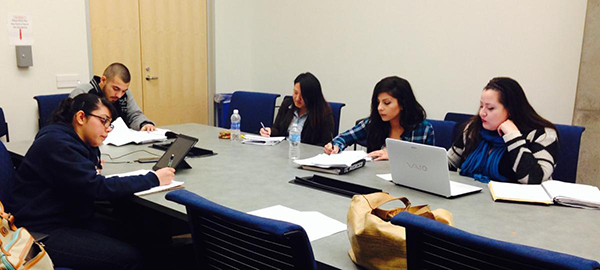
[For additional information on Sociology at UC Merced, please visit the Sociology Website]
Overview
Sociology is the scientific study of society, social institutions and social relationships. A key contribution of the discipline is that social factors matter; our lives are not only shaped by personal psychology, but also by our place in the social world. Sociology’s areas of inquiry range from intimate family relationships to ties between nation-states; from divisions by race, class, gender and sexuality to shared ideas of common culture; and from understanding the influence of broad-scale social movements to analyzing how adolescents become productive adults. Sociologists help develop theories to understand how the social world works and also use analytic tools to craft policies and create programs that address important social issues, such as neighborhood and educational inequality. Few disciplines offer such a broad scope of relevance for understanding individual and collective relations in society.
The substantive breadth and skills in conducting and analyzing research that sociology majors obtain can be useful for a range of career paths including: business and marketing, criminal justice, education, environment and technology, graduate school, law, public health, leadership in faith communities, non-profit and social service organizations, public policy, social welfare and social work. Students will leave the major with research skills developed in conjunction with knowledge of substantive material relevant to a variety of social service and non-profit research positions. They also will have an excellent basis for pursuing graduate studies in law, sociology and other social and cultural studies programs.
Program Learning Outcomes
Upon completion of the major and minor in Sociology, students will:
- Think critically about the causes and consequences of social inequality.
- Design and evaluate empirical sociological research.
- Explain and apply the major theoretical perspectives in sociology.
- Communicate orally and in writing about sociological concepts.
- Use their sociological education outside of the undergraduate classroom, particularly in their careers or further education.
Refer to the Curriculum Map to see the coherency between the Program Learning Outcomes and our course offerings.
Program Assessment Results
Each year, we assesses the learning experiences of students who major in Sociology to ensure that students are building the necessary skills and knowledge-base in this discipline. The assessments allow our program to engage in continued creative and visionary curriculum and instruction approaches that ensure students are exposed to rigorous undergraduate training. Every discipline has a unique assessment schema and set of student performance benchmarks, reflecting the priorities of the discipline.
Sociology assessed Program Learning Outcome (PLO) 4 for our majors in the 2012-2013 school-year: Communicate orally and in writing about sociological concepts. In the Spring of 2013 we examined the oral communication component of this PLO in our Advanced Sociological Research Methods class (SOC 175), which is a capstone-like experience available to a small number of sociology majors. We assessed the written communication component of the PLO in our spring Sociological Theory course (Soc 100). We also analyzed indirect evidence regarding student mastery of this outcome from the UC Merced Graduating Senior Survey for spring 2013. The results of all three assessments demonstrate that sociology students possessed strong oral and written communication skills.
- 45 majors in their senior year were sampled for this round of program assessment.
- Majority of Sociology majors demonstrated proficiency in oral communication in the first course sampled, SOC 175.
- Majority of Sociology majors demonstrated proficiency in written communication in the second course sampled, SOC 100.
Our primary recommendations for the program as we move ahead involve routinely ensuring student opportunities for writing and oral presentation across our curriculum. We provide further information on the process and outcomes of these assessment activities in our annual report (not featured here).
Alumni Success
Student graduates from our program are currently engaging in graduate studies and careers. A few of these after-college endeavors are listed below.
Graduate School
Student graduates from the Sociology program are studying at the University of California, Berkeley and the University of North Carolina.
Careers
Student graduates from the Sociology program are working in a variety of professional settings including community-based agencies in the arts and culture sector, social services organizations such as United Way, and university administration offices.
Last Updated: May 2016



